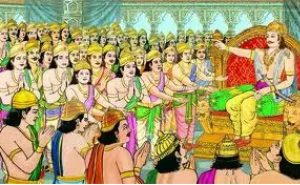Revered Shankara is by nature a perfect and committed bhAShyakAra (Commentator) that he never deviates from the text on which he is commenting upon. He always stays within the bounds of the purport of the textual line. He abhors to venture out to exploring the connected lanes and bylanes related to the topic or give vent to his own ideas based on his knowledge. However, in the entire corpus of the bhAShya literature of his, there are a few places where he takes liberty to make certain observations of his own on the verse/mantra that he happens to be commenting on. Very rare precious gems, unavailable for the reader anywhere else in the whole gamut of shruti and smriti lore, come out from his pen at those few occasions. One such instance that immediately comes to mind is his expanded commentary at 13.2, BGB where he lets out the fact that the ignorance of not knowing one’s own true nature belongs to that very person who thinks he has ignorance. He raises the question and answers it himself: Continue reading
Tag Archives: brihadaranyaka
‘brahman,’ the Bliss – 2/2
Everyone must face the consequences of his/her actions. But who is it that ensures it? Who brings a guy back, once he is dead, and make him reap his just desserts?
The scripture only can provide an answer. And the answer is:
विज्ञानमानन्दं ब्रह्म … | — 3.9.28 (7), brihadAranyaka
Meaning: Knowledge, Bliss, brahman.
Shankara explains that It is Pure Intelligence and is also Bliss. It is a Bliss not smitten with pain. It is serene, beneficent, matchless, spontaneous, ever content and homogeneous, he amplifies.
Shankara, however, says, we cannot close the issue at that. We should explore and understand better what exactly the word “Bliss” would mean.
In our normal parlance, “the word ‘bliss’ is generally known to denote pleasure.” The shruti uses the word ‘bliss’ as an adjective to brahman. Can we infer from this that shruti says brahman is pleasurable?
Here are a few more examples where the Upanishads talk of brahman and Bliss: Continue reading
‘brahman,’ the Bliss – 1/2
 Ha, finally, a gentle streak of relief seems to have descended on to the faces of the assembled august Audience, sitting on the edge of their seats for hours with knotted foreheads, wide-open eyes and mouths, waiting in tension for the next onslaught of verbal missiles. None in the Royal Assembly could answer the final question of the Challenger and that decided what was at stake for the day. The fierce war of words seems to have come to a close when the well-statured Pundit, an embodiment of Knowledge Supreme, just began to take slow and steady steps, along with a horde of his disciples, followers and admirers, towards the exit door of the Royal Court. The gathered experts started to wipe the drops of sweat on their bald pates, foreheads and chest using their upper garment as a hand towel. Rolls of murmurs and exchanges opened up among small groups of the men, cascading into unclear sounds. Some people were talking within themselves or speaking to nobody in particular as they recapitulated the dense moments and the profound depths of the discussions. Continue reading
Ha, finally, a gentle streak of relief seems to have descended on to the faces of the assembled august Audience, sitting on the edge of their seats for hours with knotted foreheads, wide-open eyes and mouths, waiting in tension for the next onslaught of verbal missiles. None in the Royal Assembly could answer the final question of the Challenger and that decided what was at stake for the day. The fierce war of words seems to have come to a close when the well-statured Pundit, an embodiment of Knowledge Supreme, just began to take slow and steady steps, along with a horde of his disciples, followers and admirers, towards the exit door of the Royal Court. The gathered experts started to wipe the drops of sweat on their bald pates, foreheads and chest using their upper garment as a hand towel. Rolls of murmurs and exchanges opened up among small groups of the men, cascading into unclear sounds. Some people were talking within themselves or speaking to nobody in particular as they recapitulated the dense moments and the profound depths of the discussions. Continue reading
pratibandha-s – part 4 of 10
j~nAna phalam
Here is the sequence of events that I believe represents the traditional understanding:
- A would-be seeker practices sAdhana chatuShTaya sampatti for a length of time in order to gain the qualities of mind (and the overriding desire to attain mokSha) needed to qualify for ‘approaching a qualified teacher’.
- The seeker gains Self-knowledge from listening to a qualified guru, i.e an enlightened shrotriya [someone with deep knowledge of the shruti, including Sanskrit], who belongs to a qualified sampradAya [teaching lineage]), as he explains the scriptures. This is the stage of shravaNa.
- When there are no further doubts, the ‘final hearing’ triggers akhaNDAkAra vRRitti (same as brahmakAra vRRitti, but used more frequently) and the seeker thereby immediately becomes a j~nAnI.
- Whilst there are still doubts, the seeker asks questions of the teacher to clarify and explain. This is the stage of manana. shravaNa and manana are then repeated for as long as needed.
- The gaining of Self-knowledge simultaneously means that the seeker now knows that he or she is already free. (You can say that they are ‘simultaneously liberated’ if you really want, but this conveys the erroneous notion that they were not free before.) Note that the phalam of ‘j~nAna phalam’ cannot simply refer to mokSha (mukti) because you cannot gain as fruit something that you already have!
- If the seeker had done sufficient sAdhana chatuShTaya sampatti (SCS) previously, he or she also simultaneously gains the phalam (= become a jIvanmukta). (See Section 3o for a discussion on the topic of jIvanmukti.)
- If their SCS was insufficient, they do not immediately gain the phalam. I.e. they have pratibandha-s and they need to do more nididhyAsana in order to remove them. Thus, they may get the phalam later in life. If they do not, they get videha mukti at death of the body-mind (when the prArabdha karma is used up). (see section 3p)
pratibandha-s – part 1 of 10
Here begins the promised article on pratibandha-s. It is actually one of the topics in the book that I am currently writing called ‘Confusions… for the seeker in Advaita Vedanta’. The book will be in two volumes: Vol. 1 – Knowledge, Experience and Enlightenment; and Vol. 2 – The World of Ignorance.
The first volume is specifically about aspects relating to what enlightenment is, how it is achieved, and its results; e.g. (facetiously) whether you gain it by reading books, dropping out of society or going into a permanent trance. The second volume will deal with what is actually taught by Advaita regarding the world, creation etc. and the various miscellaneous topics encountered on the way, such as ‘grace’, ‘teaching through silence’ etc. It will also cover the massive topic of ‘Ignorance’, although logically this might have been included in Volume 1.
Accordingly, if you read the posts of this topic (there will be 6 parts), you will encounter references to other sections and to sources that will only be referenced in the Bibliography. Please ignore these (apart from deciding that you must buy the book when it appears – probably second half of 2021.)
This post on pratibandha-s will cover the following sub-topics. Accordingly, please do not post comments on an early post that are likely to be addressed in a later one. Ideally, wait until all parts are posted before commenting, although I realize that some may find this difficult. 😉
pratibandha-s – Part 1
- prArabdha – Part 2
- vAsanA-s
- nididhyAsana – Part 3
- viparIta bhAvanA
- avidyA lesha
- j~nAna phalam – Part 4
- vij~nAna – Part 5
- ‘Who am I?’ in communication
- ‘Who am I?’ in thinking
- The ‘mixture of Atman and mind’ – Part 6
- No one is ever liberated
- Post-Shankara contributions to the concept – Parts 7 to 10
Shankara and Mind
In his comments on the post ‘SamAdhi Again (Part 2)‘, Venkat said: “Dayananda has nothing useful to say about realisation. All of his statements are his mundane interpretations that don’t reconcile to anything that the great masters from Gaudapada and Sankara have said.”
And “Could you provide a couple of quotes from Sankara to support your Dayananda comment:
“Therefore, the knowledge is that I am thoughtfree (nirvikalpa) in spite of the experience of vikalpa . . . mithyA is not a problem – it is useful; mind is useful and that is all there is to it””
This attitude was also supported by Shishya in his comment on the same post: “I think Venkat put it very well.”
Accordingly, I have collected together a number of quotations that support the contention that only knowledge (and not action or samAdhi etc.) produces enlightenment; that ‘enlightenment’ is nothing other than Self-knowledge arising in the mind; and that the mind continues after enlightenment. These quotations demonstrate that those readers who have been criticising Swami Dayananda and his followers have been doing so unjustly.
*****
A. Bhagavad Gita bhASya
2.21
“(Similarly) the same Self, which is in reality beyond all changes of state, is called ‘enlightened’ on account of discriminative knowledge separating the Self from the not-self, even though such knowledge is only a modification of the mind and illusory in character (and implies no real change of state).
2.56
“Moreover that monk (i.e. man of realization) is then called a man of steady wisdom; when his mind is unperturbed; when his mind is unperturbed by the sorrows that come on the physical or other planes; …and has gone beyond attachment, fear and anger.
and BG 2.55 says that a stitha praj~na is a man who drives away all desires that crop up in the mind. Continue reading
My Tuppence Worth
 It was over two scores and a half years ago. I remember an experience when I was living in that part of India venerated by the name AryAvarta, the holy land. The cows and other cattle had a right of way even on the so-called main roads, affectionately christened ‘M.K. Gandhi Marg’ ‘P.C. Chatterji Panth’ or some such tongue twisters by the locals. The citizens or rather the bodies of the inhabitants have a natural agility and ability to automatically adopt all the tricks of an expert contortionist in walking on the road avoiding the animals or their heaps and spurts of fragrant fresh just-in-time deliveries – made, as though, just for you. When you are all focused on keeping your balance as you never know where your next step may have to land, a hearty greeting jolts your auditory senses. You take time to locate the source of that sound, because there is obviously no face visible nearby. You see at a distance a half raised single hand, as a mark of showing respect for you. Adept practitioners of Zen may not know the clap of a single hand, but every one over there knows a salutation by one hand. Their shout says ‘su prabhAtaM,’ a literal translation for “Good Morning.” Continue reading
It was over two scores and a half years ago. I remember an experience when I was living in that part of India venerated by the name AryAvarta, the holy land. The cows and other cattle had a right of way even on the so-called main roads, affectionately christened ‘M.K. Gandhi Marg’ ‘P.C. Chatterji Panth’ or some such tongue twisters by the locals. The citizens or rather the bodies of the inhabitants have a natural agility and ability to automatically adopt all the tricks of an expert contortionist in walking on the road avoiding the animals or their heaps and spurts of fragrant fresh just-in-time deliveries – made, as though, just for you. When you are all focused on keeping your balance as you never know where your next step may have to land, a hearty greeting jolts your auditory senses. You take time to locate the source of that sound, because there is obviously no face visible nearby. You see at a distance a half raised single hand, as a mark of showing respect for you. Adept practitioners of Zen may not know the clap of a single hand, but every one over there knows a salutation by one hand. Their shout says ‘su prabhAtaM,’ a literal translation for “Good Morning.” Continue reading
Should I stop enquiring???????
 Should I stop enquiring???????
Should I stop enquiring???????
Vijay Pargaonkar
(मुञ्डकोपनिषत्) MundakaUpanishat 3-2-9
“Anyone who knows that supreme Brahman becomes Brahman indeed……….”
My search for Brahman started with aparokshAnubhUti (supposedly written by Shankaracharya) where it is stated that knowledge of liberation is obtained through enquiry. It then goes on to explain what constitutes enquiry: (अपरोक्षानुभूती) aparokshaAnubhUti (Shloka #11 & #12) (translation by Vimuktananda)
“Knowledge is not brought about by any other means than Vichara (Enquiry), just as an object is nowhere perceived (seen) without the help of light”.
“Who am I? How is this (world) created? Who is its creator? Of what material is this (world) made? This is the way of that Vichara (Enquiry)”. Continue reading
